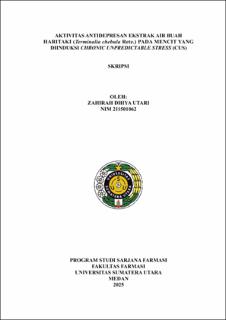Aktivitas Antidepresan Ekstrak Air Buah Haritaki (Terminalia chebula Retz.) pada Mencit yang Diinduksi Chronic Unpredictable Stress (CUS)
Antidepressant Activity of Aqueous Extract of Haritaki Fruit (Terminalia chebula Retz.) on Chronic Unpredictable Stress (CUS) Induced Mice

Date
2025Author
Utari, Zahirah Dhiya
Advisor(s)
Dalimunthe, Aminah
Yusoff, Syaratul Dalina binti
Metadata
Show full item recordAbstract
Background: depression is a chronic mental disorder that has a significant impact on global well-being. Imbalances in neurotransmitters such as serotonin and dopamine contribute to the pathophysiology of depression. The use of antidepressant drugs has limitations such as side effects and therapy resistance, so a safer and more effective alternative is needed. The aqueous extract of haritaki (EABH) contains bioactive compounds such as tannins and flavonoids that have potential antidepressant effects.
Objective: to evaluate the antidepressant effect of haritaki fruit aqueous extract on mice induced chronic unpredictable stress.
Method: an experimental study was initiated with the preparation of EABH. Thirty rats were divided into 6 groups: (1) Normal; (2) Fluoxetine 10 mg/kgBW; (3) Distilled water; (4) EABH 25 mg/kgBW; (5) EABH 50 mg/kgBW; (6) EABH 100 mg/kgBW. Stress induction was carried out with the Chronic Unpredictable Stress (CUS) method on day 1 to day 14, followed by treatment according to the group on day 7 to day 21. Antidepressant activity was evaluated by Forced Swim Test (FST) method on days 7, 14, 21, and Open Field Test (OFT) on day 21 through ANY-maze software. Data were statistically analysed using GraphPad Prism 10 program with 95% confidence interval.
Results: among the tested doses, the 50 mg/kgBW group showed a tendency to decrease immobility time in the FST, but the results were not statistically significant. The OFT test showed that the aqueous extract of haritaki fruit did not significantly affect locomotor activity, indicating that the antidepressant effect of haritaki fruit is not associated with increased motor stimulation.
Conclusion: the aqueous extract of haritaki fruit does not have potential as antidepressant although there is a decrease in immobility time compared to control.
Collections
- Undergraduate Theses [1837]
